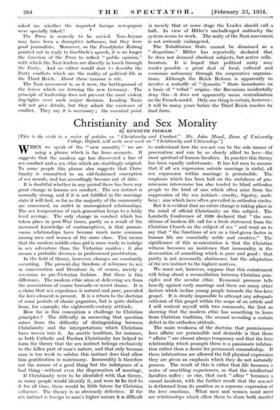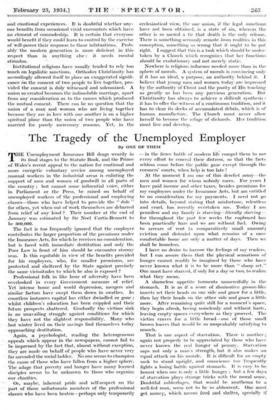Christianity and Sex Morality
By KENNETH INGRAM
[This is the sixth in a series of articles on " Christianity and Conduct." Mr. John Maud, Dean of University College, Oxford, will write next week on " Christianity and- Citaenship' ."1 WHEN we speak of the " new morality " we are using a phrase which is far from accurate. It suggests that the modern age has discovered a line of sex conduct and a sex ethic which are startlingly original. To some people this phrase also suggests that Chris- tianity is committed to an old-fashioned conception of sex morals, and has accordingly become out of date.
It is doubtful whether in any period there has been any great change in human sex conduct. The sex instinct is normally strong, and if it is not fulfilled in the marriage state it will find, so far as the majority of the community are concerned, an outlet in unrecognized relationships. The sex temperature of each generation keeps to a fairly level average. The only change in conduct which has taken place in post-War times, partly as a result of the increased knowledge of contraceptives, is that promis- cuous relationships have become much more common among men and women of the same class. This means that the modern middle-class girl is more ready to indulge in sex adventure than the Victorian maiden : it also means a probable decrease in professional prostitution.
In the field of theory, however, changes are constantly occurring. The present-day freedom of reference to sex in conversation and literature is, of course, merely a reversion to pre-Victorian fashion. But there is this difference. The modern ethic aims at delivering sex from the associations of coarse bravado or secret shame. It is a claim that sex experience is natural and pure, provided the love-element is present. It is a return to the doctrine of some periods of classic paganism, but is quite distinct from, for example, the eighteenth-century attitude.
How far is this conception a challenge to Christian principles ? The difficulty in answering that question arises from the difficulty of distinguishing between Christianity and the interpretations which Christians have woven into it. An ascetic tradition, for instance, in both Catholic and Puritan Christianity has helped to form the theory that the sex instinct belongs exclusively to the fallen part of man's nature, and that only because man is too weak to subdue this instinct does God allow him gratification in matrimony. Immorality is therefore not the misuse of a good thing but the indulgence of a bad thing—without even the dispensation of marriage, If Christianity were to be identified with this theory, as many people would identify it, and were to be tied to it for all time, there would be little future for Christian iifluence. The theory is so obviously defective. If the sex instinct is foreign to man's higher nature it is difficult to understand how the sex-act can be the sole means of procreation and can be so closely allied to love—the most spiritual of human faculties. In practice this theory has been equally unfortunate. It has led men to assume that if all sex expression outside marriage is sinful, all sex expression within marriage is permissible. The emphasis which has been laid on the sinfulness of pro- miscuous intercourse has also tended to blind orthodox people to the kind of sins which often arise from the suppression of the sex instinct—cruelty, bigotry, snob- bery: sins which have often prevailed in orthodox circles.
But it is evident that an entire change is taking place in the mind of official Christianity on this subject. The Lambeth Conference of 1930 declared that " the con- ditions of modern life call for a fresh statement from the Christian Church on the subject of sex " and went on to say that " the functions of sex as a God-given factor in human life are essentially noble and creative." The significance of this re-orientation is that the Christian witness becomes an insistence that immorality is the desecration of something which is pure and good : that • purity is not necessarily abstinence, but the adaptation of the sex instinct to the highest motives.
We must not, however, suppose that this restatement will bring about a reconciliation between Christian prin- ciples and the secular ethic. Economic pressure tells heavily against early marriage and there are many other factors which incline young people towards the free-love gospel. It is clearly impossible to attempt any adequate criticism of this gospel within the scope of an article and I will content myself with two comments, the first as showing that the modern ethic has something to learn from Christian tradition, the second revealing a certain defect in the orthodox attitude.
The main weakness of the doctrine that promiscuous love affairs are permissible and desirable is that these " affairs " are almost always temporary and that the love relationship which prompts them is a passionate infatua- tion rather than a desire for permanent comradeship. If these infatuations are allowed the full physical expression they are given an emphasis which they do not naturally possess. The result of this is either that life becomes a series of unsettling experiences, so that the intellectual faculties suffer : or else, that each " affair " becomes a casual incident, with the further result that the sex-act is dethroned from its position as a supreme expression of the love emotions. What men and women most need are relationships which allow them to share both mental and emotional- experiences. - It is doubtful whether any- one benefits from occasional vivid encounters which have no element of comradeship. It is certain that everyone would benefit if they could learn to.control by the exercise of will-power their response to these infatuations. Prob- ably the -modern generation is more deficient in this respect than in anything else it needs mental stimulus.
• 'Institutional religions have usually tended to rely too much On legalistic •sanctions. Orthodox Christianity has accordingly.allowed itself to place an exaggerated signifi- canee On the consent of two people to live together, pro- vided the consent is duly witnessed and solemnized. A union so created becomes the indissoluble marriage, apart from any consideration as to the causes which produced -the mutual consent. There can be no question that the union of a man and woman who are living together because they are in love with one another is on a higher spiritual plane than the union of two people who have married for purely mercenary reasons. Yet, in the ecclesiastical view, the- one union, if the legal_ sanctions have not been obtained, is a state of sin, whereas the other is so sacred a tie that death is the only release. There is somethingseriously remote from realities in this conception, something so wrong that it ought to be put right. I suggest that this is a task which should be under- taken by a Church which recognizes that her functions should be evolutionary and not merely static. • Nowhere is religious influence needed more than in the sphere of morals. A system of morals is convincing only if it has an ideal, a purpose, an authority behind it. I believe that young men and women today are impressed by the authority of Christ and the purity of His teaching as greatly as has been any previous generation. But Christianity has always to achieve a difficult synthesis : it has to offer the witness of a continuous tradition, and it has to clear its decks of accumulated debris, which is of human manufacture. The Church must never allow herself to become the refuge of diehards. Her tradition must live and develop.

















































 Previous page
Previous page